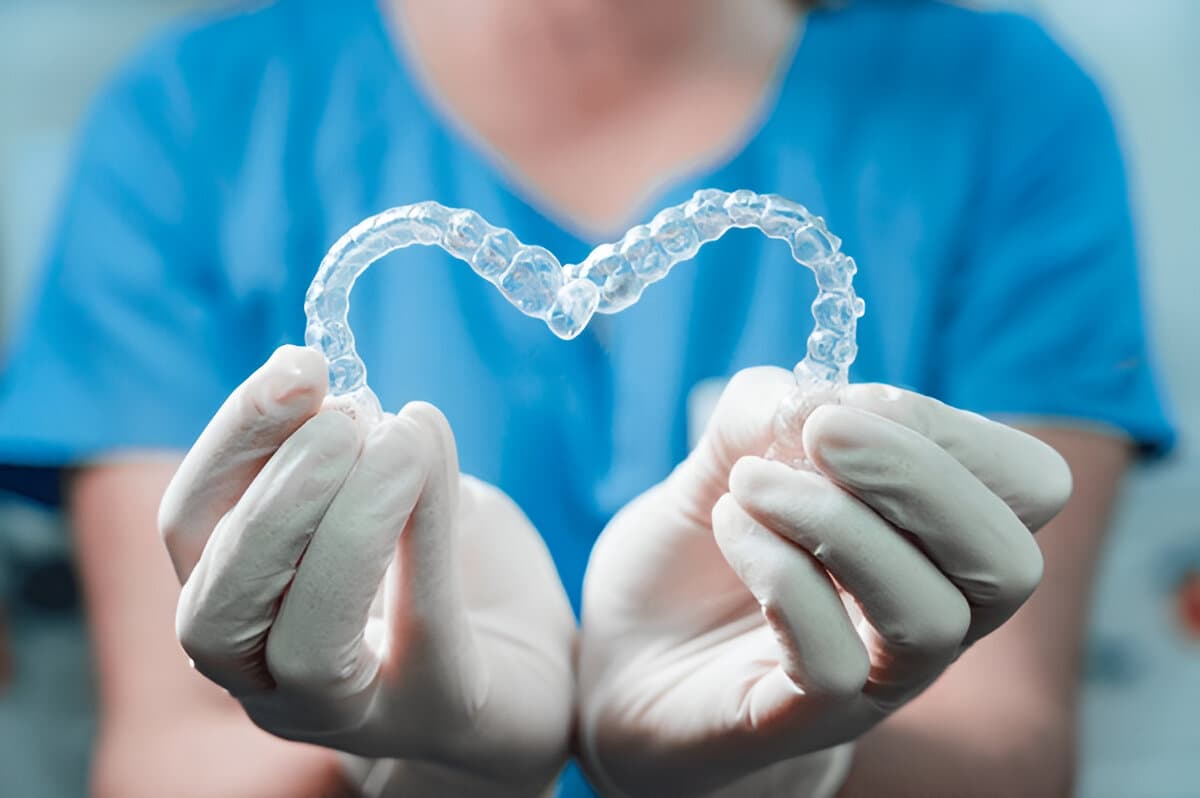A beaming smile can enhance confidence and leave a lasting impression. Professional whitening treatments ensure immediate results, yet many seek at-home teeth whitening tips that are effective and safe. The following comprehensive guide emphasizes natural dental hacks for teeth whitening at home, backed by dentists, such as how to obtain a whiter smile from home.
1. Baking Soda: Nature’s Gently Abrasive Scrubber
Can Baking Soda Bleach Teeth?
Baking soda, or sodium bicarbonate, is among the oldest and most commonly used natural home treatments to whiten teeth. It is utilized for the fact that it is inexpensive, easy to find, and possesses chemical properties that render it appropriate for cleaning and whitening the teeth.
What makes baking soda stand out is its slight abrasiveness. It will not bleach the teeth like professional whitening does, but it will help to remove surface stains caused by food, beverages, and lifestyle activities such as smoking. These stains usually occur from pigments sticking to the surface of your enamel over time.
Also, baking soda is basic in nature, hence it can neutralize acids present in the mouth. Foods containing sugar, soft drinks, or certain fruits give off acids that can weaken tooth enamel and give rise to bacteria. Neutralizing these acids by baking soda not only maintains oral pH in equilibrium but also helps in better oral health overall.
However, it’s important to note that baking soda does not contain bleaching agents like hydrogen peroxide. Therefore, while it can remove extrinsic stains (surface staining), it will not change the intrinsic color (original inner color) of your teeth or remove deep stains brought about by age, trauma, or medication.
How to Use Baking Soda for Teeth Whitening at home
To whiten teeth using baking soda is simple and can be done at home with minimal effort. But one must use it correctly to make it safe and effective.
1. Preparation
Start by preparing a basic baking soda paste:
- Place one teaspoon of baking soda in a little bowl.
- Add a few drops of water to the powder—enough to form a thick, consistent paste.
- Stir with a small spoon or your toothbrush to the consistency of toothpaste.
Optional ingredients: Some people add a drop of peppermint oil to leave their breath smelling fresh or a pinch of turmeric (another natural anti-inflammatory), but you should attempt the simple paste first, especially if your teeth are sensitive.
2. Application
- Dip a toothbrush in the baking soda paste.
- Gently brush teeth in a circular motion for two minutes, completely covering all surfaces.
- Do not scrub too hard, which will wear away enamel over time.
- When done, spit out the water and then use regular fluoride toothpaste to clean through and remineralize.
3. Frequency
While baking soda is milder than some other whitening agents, it is nevertheless an abrasive substance. Excessive use can cause thinning of the enamel, which not only leads to sensitivity but, in the long term, can make your teeth appear yellower (as the dentin beneath becomes more apparent).
- The American Dental Association suggests application of a paste of baking soda no more frequently than 2–3 times a week.
- On other days, employ regular fluoride toothpaste and standard oral hygiene practices.
2. Coconut Oil Pulling: Ancient Tradition with Modern Appeal
Does Coconut Oil Whiten Teeth?
Oil pulling is an old Ayurvedic oral technique that has become newly popular in modern holistic health in recent years. The process is to swish oil around the mouth, usually coconut oil, in hopes of removing bad bacteria, improving oral health, and even whitening teeth.
Coconut oil is specifically well-loved for oil pulling due to the fact that it is antibacterial, antifungal, and anti-inflammatory as a result of the high rate of lauric acid composition. Lauric acid effectively attacks plaque-producing bacteria, such as Streptococcus mutans, one of the leading perpetrators of tooth decay and gum disease.
And, last but not least, the question everyone’s been waiting for: Does coconut oil actually whiten teeth?
While there is not a great deal of scientific evidence to definitively state that oil pulling whitens teeth, many users who use it on a regular basis report that they can see a noticeably whiter smile. This is probably due to:
- The elimination of plaque and bacteria that discolor the tooth surface.
- The reduction in surface stains caused by coffee, tea, or wine.
- The overall health improvement of oral hygiene, providing gums with a healthier appearance with a fresher look.
However, oil pulling does not chemically whiten teeth like professional teeth-whitening products (e.g., hydrogen peroxide) do, nor does it change teeth’s natural color. Its whitening action is more of bringing back your own natural tooth color by making the mouth cleaner and plaque-free.
How to Practice Oil Pulling
The beauty of oil pulling is its ease. It requires no equipment or instruments—simply good-quality coconut oil and a little bit of free time. Here is how to do it effectively to get the best benefit:
- Technique: Swish the Oil
- Begin with a spoonful of cold-pressed, organic coconut oil. If solid at room temperature, melt in your mouth—it melts in seconds.
- Swish the oil slowly around your mouth. Let it coat all surfaces—between teeth, under the tongue, and around the gums.
- Swish for 15–20 minutes. This is the optimal time: long enough for the oil to blend with saliva, soak up toxins, and attract bacteria, but not so long that it becomes tiring or uncomfortable.
Tip: Don’t swish too hard. Gentle movement works better and avoids jaw fatigue.
- Post-Swish: Spit and Rinse
- Wait 15–20 minutes before spitting the oil into a garbage can, not the sink, since coconut oil hardens and will clog drains.
- Spit out after rinsing mouth with warm water. Saltwater rinse is applied by some for additional antibacterial effect.
- End the process by brushing teeth as normal. This is to scrub away any left-over oil and bacteria.
- Use Daily for Maximum Benefit
- For optimal oral benefits, we recommend oil pulling once a day, ideally before consumption or beverages in the morning.
- Add to your daily routine for oral cleaning, brushing, flossing, and scraping of the tongue.
Consistency matters. Though you may already sense freshness of the breath and gums within a week, seven days, whitening effect, if any, could take weeks to manifest in consistent daily usage.
Whitening Toothpastes: Daily Brightening
Effectiveness of Teeth Whitening Toothpaste
Teeth whitening toothpastes contain mild abrasives and chemical components that remove stains on the tooth surface. They do not alter the natural color of the teeth or eliminate deeper stains.
GoodRx
Choosing the Right Whitening Toothpaste
- Ingredients: Choose toothpastes containing hydrogen peroxide or carbamide peroxide for best whitening.
- Usage: Brush twice daily for optimum results.
- Sensitivity: If sensitive, use sensitive-teeth toothpastes.
Regular use for weeks can cause dramatic improvements in tooth color.
Hydrogen Peroxide: A Gently Bleaching Agent
Is Hydrogen Peroxide Safe to Whiten Teeth?
Hydrogen peroxide is a frequent active ingredient in whiteners because it has bleaching properties. It will whiten teeth if used properly.
Using Hydrogen Peroxide at Home
- Dilution: Mix equal proportions of hydrogen peroxide (3%) and water.
- Application: Mouth rinse with the solution for 30 seconds to 1 minute.
- Frequency: Apply a few times a week, being careful not to overdo it to prevent tooth sensitivity.
Always consult a dentist before applying any whitening product with hydrogen peroxide.
Oral Hygiene: The Secret to a Blinding Smile
Daily Routines for Whiter Teeth
- Brushing: Brush at least twice a day with fluoride toothpaste.
- Flossing: Floss once a day to clear plaque between the teeth.
- Mouthwash: Use an antibacterial mouthwash to clear plaque and stains.
- Routine Dental Visits: Have check-ups and cleanings every six months.
Good oral hygiene, not only the whitening of teeth, is beneficial for overall dental wellness.
Dietary Preferences: Eating for a Whiter Smile

Drinks to Limit
- Staining Agents: Coffee, tea, red wine, and dark berries will stain teeth.
- Acidic Foods: Sodas and citrus fruits can possibly erode the enamel, so the teeth will be more susceptible to staining.
Foodthat Nurtures Dentistry
- Crunchy fruits and vegetables: apples, celery, and carrots brush tooth surfaces.
- Dairy products: Cheese and yogurt have calcium that hardens to strengthen enamel.
Mouth rinsing with water after eating color-troubling food will diminish the effect on dental color.
Natural Medicine: Other Remedies
Apple Cider Vinegar
Some recommend utilizing diluted apple cider vinegar as a tooth whitener because it is acidic. Its extreme acidity will dissolve enamel, though, so use it carefully.
Activated Charcoal
Activated charcoal is made to pick up stains and toxins. But with its abrasiveness, it will eventually wear away enamel. Use cautiously and consult with a dentist prior to attempting this technique.
Understanding the At-Home Teeth Whitening Safety
Is Teeth Whitening Safe?
At-home teeth whitening is safe if used appropriately. It may lead to tooth sensitivity and erosion of enamel through overuse or misuse.
Safe Whitening Tips
- Read Instructions: Use product instructions only.
- Watch for Sensitivity: If you feel uncomfortable, slow down or talk to a dentist.
- Don’t Overdo it: Excessive whitening can harm teeth and gums.
Pre-whitening consultation by dental professionals ensures to guarantee security and efficacy.
Conclusion: Achieving a Brighter Smile with Dental Scotland
While numerous natural methods can aid in teeth whitening at home, it’s essential to approach each method with care, consistency, and realistic expectations. Techniques like brushing with baking soda, practicing coconut oil pulling, and using teeth whitening toothpaste are among the most accessible and cost-effective ways to maintain a brighter smile naturally. These methods can gradually remove surface stains and contribute to better oral hygiene, but they may not deliver dramatic results overnight.
For individuals seeking the best way to whiten teeth, combining natural remedies with proper dental care routines—like regular brushing, flossing, rinsing after meals, and mindful dietary habits—can be very effective. Using home teeth whitening products such as over-the-counter whitening strips or dentist-recommended custom trays can further enhance results. Still, questions like “is teeth whitening safe?” remind us that professional advice is often key, especially when dealing with enamel sensitivity or deeper discoloration.
At Dental Scotland, we understand that everyone’s smile is unique. Whether you’re interested in natural teeth whitening at home, in-office whitening treatments, or exploring comprehensive dental care options, our experienced team is here to guide you. We provide a wide range of services including general dentistry, cosmetic treatments, orthodontics, and preventive care tailored to your individual needs. If you’re unsure which whitening method suits you best—or if you’d like to pair your at-home regimen with professional treatment—our dental experts are happy to help.
Take the first step toward a brighter, healthier smile today. Dental Scotland is committed to helping you achieve optimal oral health and a smile you can be proud of—naturally or professionally.



















